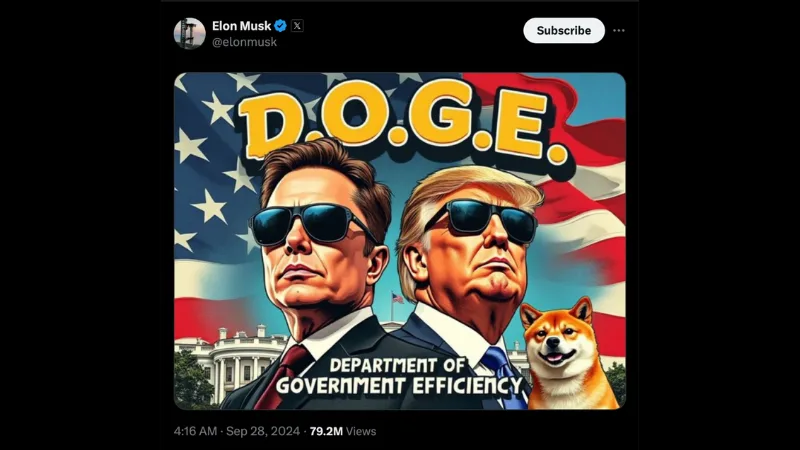Elon Musk has built a reputation for disrupting industries, from launching reusable rockets with SpaceX to transforming the electric vehicle landscape with Tesla. His track record demonstrates an affinity for efficiency, innovation, and eliminating waste. If Musk were to address government inefficiencies, he might employ strategies used in his businesses to make taxpayer dollars go further. Here’s a look at seven Musk-inspired strategies that could reshape government spending and reduce waste.
1. Streamlining Bureaucracy with Automation
Musk is a strong proponent of automation, using it extensively in Tesla’s manufacturing process to improve productivity. In government, automation could streamline bureaucratic processes, cut down paperwork, and speed up approvals, reducing bottlenecks in areas like immigration, tax processing, and healthcare administration.
For example, Musk’s use of advanced AI and robotic automation at Tesla’s Fremont factory has allowed the company to produce vehicles more rapidly than traditional auto manufacturers, driving down costs over time. Governments could implement similar systems in departments that handle repetitive paperwork, like the Department of Motor Vehicles or public records offices, to enhance productivity. According to the Brookings Institution, automating government services could save billions annually by cutting down on labor costs and administrative time.
2. Setting Aggressive Performance Metrics
Musk is known for setting ambitious goals, even when they seem impossible. For example, SpaceX aimed to reduce the cost of launching rockets by creating reusable boosters, and despite skepticism, it succeeded. If Musk were to reduce government waste, he might establish clear performance standards to ensure that taxpayer money is being put to good use.
Federal agencies could adopt similar metrics, incentivizing departments to meet cost-saving and productivity goals. Setting KPIs (Key Performance Indicators) would encourage a results-driven approach across departments, where programs are evaluated regularly, and only those that meet benchmarks continue receiving funding. In this model, the same level of accountability Musk demands in his companies could be implemented to push departments to reach new standards of efficiency.
3. Eliminating Redundant Programs
Redundancy is a costly issue in government, where many programs overlap. Musk, who often focuses on streamlining processes, would likely advocate for a comprehensive review of federal programs to identify and consolidate those with overlapping objectives.
In 2019, the Government Accountability Office identified over 200 federal programs focused on similar goals, such as job training and financial assistance, which together cost billions each year. Musk might approach this by implementing a program similar to his restructuring efforts at Twitter, where he cut excess roles and streamlined operations to ensure every part of the organization contributed to its central mission. A similar effort in the federal government could consolidate programs, eliminating waste and improving outcomes by focusing resources on what works best.
4. Encouraging Innovation-Driven Solutions
Elon Musk’s approach to problem-solving often involves leveraging cutting-edge technology to address long-standing challenges. For instance, his Boring Company, which develops tunnel infrastructure, aims to tackle urban traffic issues by creating underground transit solutions. In government, a Musk-inspired strategy could involve investing in innovative technologies to make government services more accessible and efficient.
For example, blockchain technology could be used to secure voting systems and make them more transparent, which has already been piloted in certain states. Another opportunity could be using AI-driven predictive analytics in healthcare and welfare to anticipate resource needs, reducing waste by allocating funds and services where they’re truly needed. By investing in future-proof solutions, government agencies could improve their services while simultaneously reducing waste.
5. Bringing in a Private Sector Mentality
Musk often employs a cost-conscious mentality, notably in SpaceX’s cost-cutting measures that made it the go-to provider for commercial and governmental space launches. Government agencies, on the other hand, often lack the budget discipline seen in the private sector. Implementing a similar mindset in federal and state agencies could push them to manage budgets more effectively.
For example, Musk cut SpaceX’s costs by creating reusable rockets instead of using the traditional model of single-use ones, saving millions per launch. A similar cost-conscious approach could benefit government contractors, with agencies required to show a clear return on investment for ongoing projects. Encouraging agencies to make data-driven spending decisions could eliminate waste on initiatives that don’t deliver clear public benefits.
6. Fostering Competition and Reducing Monopolies
Musk believes competition drives innovation, as seen in Tesla’s open-sourcing of its patents to encourage advancements in the EV market. In government, promoting competition for federal contracts could help break monopolistic tendencies, where contracts are often awarded to the same companies repeatedly, even if costs are high.
For example, in 2020, the Department of Defense opened contracts to smaller firms for tech-based solutions, which saved millions on IT and infrastructure costs. By broadening the playing field, government agencies could invite a wider array of suppliers, pushing for quality at competitive prices and reducing reliance on high-cost contractors.
7. Promoting Decentralized Decision-Making
At Twitter, Musk has allowed for more autonomy among teams, pushing decision-making down to operational levels. In government, decentralizing control could mean giving state and local agencies more decision-making power to address local needs without going through extensive federal approval processes.
For example, federal grants often come with complex requirements and timelines. By giving local governments more discretion, they could use funds in ways that best meet the specific needs of their communities. According to the National League of Cities, this type of decentralization can lead to greater efficiency as local agencies often understand their issues better than distant federal authorities.
Conclusion:
Elon Musk’s approach to reducing government waste would likely involve a mix of streamlining, innovation, and accountability. Drawing on the strategies he’s used to make his own businesses more efficient, Musk could help reshape government spending by emphasizing transparency, competition, and technological advancement. While such a shift would require considerable effort, the potential savings and improved service efficiency could make the endeavor worthwhile.





